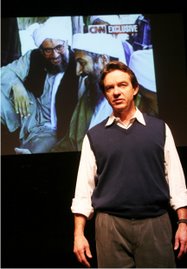(Before the titular stuff, mad props to Roger Cohen for his concise, timely defense of secularism in today's NYTimes.)
Ahem.
Props to Ron Paul for saying, in the Republican debates last night:
"We [Americans] maintain an empire which we can't afford."
His answer to budgetary questions, unlike the other candidates', made sense; he recognized that America's attempts to police the world and bully oil-producing nations not only isn't helping us, it's costing us two arms, three legs, and part of a pelvis.
And when asked what he would do in his first year in office:
"We would threaten nobody." Word.
Also, not to be overlooked, Ron Paul on trade:
"It's time we changed our attitude about Cuba."
Mitt Romney had this to say about taxes:
"I don't stay awake at night worrying about the taxes that rich people are paying."
Of course, he followed up by calling for tax-cuts, but at least not rich-people tax-cuts.
Rudy didn't think a failing economy was as big a deal as "Islamic terrorism," which has certainly been the reason behind all my money woes. If only Al-Qaeda of Mesopotamia would stop messing with our housing market and vitiating the middle class... Those rascals.
Fred Thompson was the most frustrating candidate, refusing at first to answer a simple yes or no question about whether or not global climate change was a serious threat caused by humans. (Of course, the moderator should have added "caused in part by humans," or something to that effect - "certainly not helped by human pollution," etc.)
Alan Keyes declined to talk about the environment, instead attacking his opponents and saying America should reduce "hot air" (from politicians); Thompson then - I don't know why, exactly, perhaps in a fit of Dada - said he "agreed with Alan Keyes's position on global warming." Which was cute, but meant he never actually addressed our warming, tidal wave-wracked globe.
Tom Tancredo and Mike Huckabee were both weak on green, the former saying he doesn't believe in mandates. (I.e., simply because the vast majority of us don't want to live in a warm, wet, smoky, landless swamp in a few hundred years, that doesn't mean Tancredo [had anyone heard of him before last night?] and his lizard-people should listen to us.)
Huckabee was quite simply weak. Instead of espousing a coherent policy on/acknowledgment of energy emissions, oil production, the car industry, etc., the Huckster said the U.S. government is the world's biggest energy-user and should therefore be cut down to size, which makes sense most if you're talking - like the Dems (minus Hillary) and Ron Paul - about reducing the U.S. war-machine.
But Huckabee had already said defense was one of three primary features of the vital modern state (including food and oil); he literally called for the U.S. to be able to make its own "tanks, airplanes, bullets, and bombs." Sheesh.
Correct me if I'm wrong, but outsourcing the making of our tanks has never been the issue, no? We're not losing any wars (say, the war against religious extremism, here and abroad) due to lack of/shoddy manufacturing of tanks.
Anyway, Chuck Norris aside, Huckabee is not inspiring.
Duncan Hunter won the G.W.B. Education Award of the evening, however: When asked about, well, education, he said, "Three words: Jaime Escalante and inspiration." Those are four words, Dunk. (You just got slammed.) [Sorry, bad pun.]
No mention of gay rights.
But to bookend:
The whole thing - the gyre of history - turns on this question of religiosity. When asked about "values" (what a terrible reduction/conflation of "metaphysics," "ethics," and "morals"), or in Keyes's case when asked anything, the candidates focused on themselves instead of on the whole of the not necessarily white, not necessarily Christian whole of America.
Instead of saying "church and state are separate; you can be a Muslim-American, a Christian-American, a Buddhist-American, a Satanist-American, an atheist-American, etc.," or anything even remotely similar, they spent their precious seconds trying to out-faith one another.
Need we be reminded? Ours is not a country of "faith," but of reason and individuality: Reason rules the government; individuals are then free to be as faith-y or faithless as they like.
If the government were, say, Buddhist, the Catholics might get mad; if the government were Catholic, the Lutherans might throw a fit, and so on. It's a balancing act wherein the fulcrum is an absence - an absence of a state faith. In fact, it's an absence of any metaphysical principle whatsoever.
"The universe exists and we exist in it" is pretty much the only metaphysical proposition the Framers left us. Some very severe atheists might even take issue with that, but I think 99.999% of Americans can say that, yes, the universe somehow exists.
(Yes, there's the "Creator" bit in the Declaration of Independence, but look at it in context - "endowed by their Creator" is just Deist slang for "alive." Doesn't go into detail about who that Creator is or in what sort of metaphysical hooptie he cruises through time-space.
Full breakdown: Constitution: 0 "God"s, 0 "Creator/created"s; Dec.o.Ind.: 1 "God," 1 "Creator," 1 "created.")
Anyway, I try to take Republicans seriously, as seriously as cancer and good hygiene (both of which, I think, we should consider very seriously), but I just don't get the problem with separating church and state. Seems like a tidy, no-hassle solution to an otherwise impossible problem.
Newest dream-team: Colbert/Bell Hooks '08.
Subscribe to:
Post Comments (Atom)




No comments:
Post a Comment